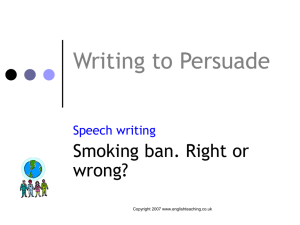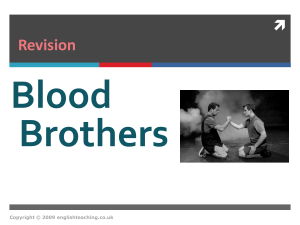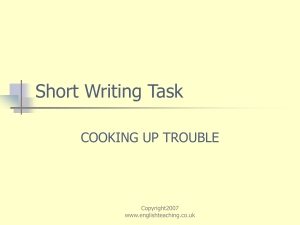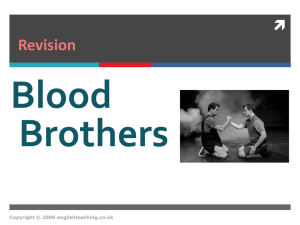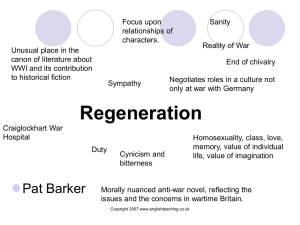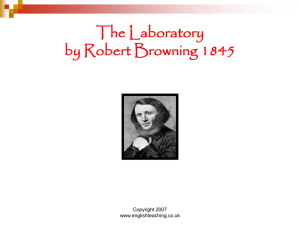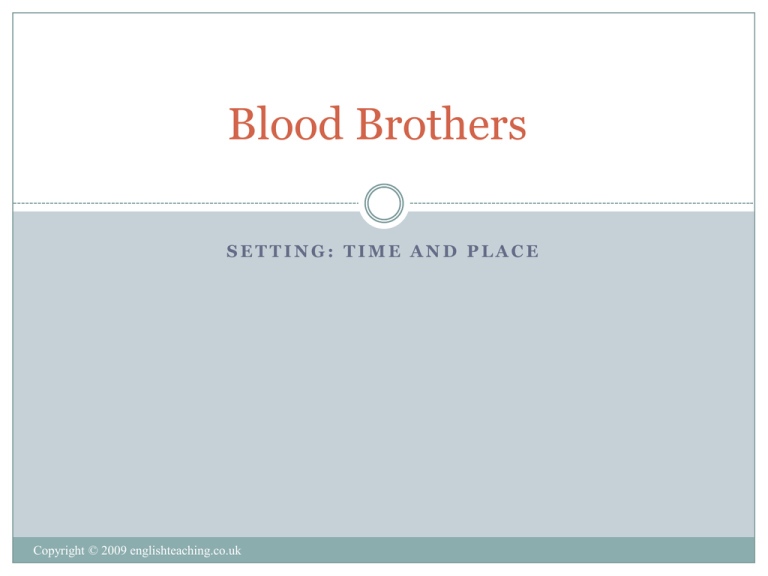
Blood Brothers
SETTING: TIME AND PLACE
Copyright © 2009 englishteaching.co.uk
Place: Liverpool
Liverpool, because of its position on the River
Mersey, was a prosperous seaport in the 19th
century.
It is a city of many contrasts.
In the 20th century, because of the silting of the
river, it was a place of financial depression, which
led to unemployment and strikes.
There was a big gap between the rich and the poor.
Copyright © 2009 englishteaching.co.uk
The people of Liverpool
Liverpudlians are known for
their warmth, hospitality and
wit.
Liverpool is also famous for
its football teams and impact
on culture – the Mersey Beat
(poetry), the Beatles (music)
and playwrights, architects
etc.
Mrs Johnstone’s wit and
warmth typify these qualities.
Copyright © 2009 englishteaching.co.uk
Unemployment
Unemployment reached 25% in the 1980s.
At the time the play is set, factories were closing
down. At the start of act 2, Sammy is already on the
dole, and the song ‘Take a Letter Miss Jones’
illustrates how this rising unemployment adversely
affects Mickey’s life and tempts him into crime.
Being out of work creates low self–esteem;
particularly for traditional men who feel they need
to support their family.
Copyright © 2009 englishteaching.co.uk
Time
Blood Brothers is set in Liverpool,
between the 1950s and the 1970s.
At the time, people strongly
disapproved
of
sex
before
marriage and this is why Mrs
Johnstone ‘has to’ marry quickly.
Divorce was uncommon and this
is another reason the neighbours
might disapprove of her.
Copyright © 2009 englishteaching.co.uk
Education
Although
the 1945 Education act had made
grammar schools free, working class children had
to pass the 11+ to gain entry to the grammar
schools. The pass mark was kept deliberately high.
Few children were allowed the privilege of a
grammar school education, and even if they gained
a place, there was no guarantee that they would
leave with qualifications, as the school leaving age
was 15.
Copyright © 2009 englishteaching.co.uk
Grammar Schools
Pupils at grammar schools studied academic subjects
and took O levels. Some went on to take A levels,
while others were under pressure from parents to
leave school, get a job and bring money into the
household.
There were far fewer university places then, so most
would go into employment after school.
Copyright © 2009 englishteaching.co.uk
Secondary Modern schools
Children who failed the 11+ would go to a secondary
modern school to be prepared for life in the trades.
Boys would study practical skills like bricklaying,
alongside academic work, and girls would learn how
to cook. Many of these schools were under-funded.
Copyright © 2009 englishteaching.co.uk
Qualifications
If pupils were not considered ‘bright’ they were not
allowed to take CSEs. These qualifications were not
worth as much as O Levels, taken at grammar school.
(GCSEs are much more inclusive) So it was common
for children to leave school without any
qualifications at all. It was more difficult for them to
get on in life.
Copyright © 2009 englishteaching.co.uk
Poverty
There is a clearly established link between poverty
and under-achievement at school. Edward is sent
to a private, fee-paying boarding school and will
take O levels, A levels and go on to university.
Mickey leaves school and goes into employment;
things go wrong when he is made redundant,
whereas Edward has a much more secure ‘white
collar’ job. Manual workers were called ‘blue
collar’ workers; they were more affected by
closure of factories and the scarcity of work
connected with the docks.
Copyright © 2009 englishteaching.co.uk
Council Housing
Council houses were the homes of most working
class people in the 1950s and 1960s. The terraced
houses had a lot to recommend them, but they
were also cramped and lacked inside toilets and
bathrooms. They did not have central heating and
were heated mostly by coal fires. Their inner city
locations were often dirty and there was nowhere
for children to play as they rarely had gardens.
Copyright © 2009 englishteaching.co.uk
‘New’ Towns
To improve standards of living, the government
moved people away from the terraced houses into
new council accommodation in the countryside.
‘New’ towns were created like Skelmersdale, and
existing places were developed, like Runcorn and
Winsford. Some high rise blocks were built also.
Copyright © 2009 englishteaching.co.uk
Bright New Day
Mrs Johnstone’s family is certainly helped by their
move, although not as much as she had hoped.
In many ways, it is already too late for the older
children, and the unemployment situation was
often worse away from the city.
Also, many missed the people and the amenities
that they had known before, and the support
network that existed all but vanished. Uprooting
people can cause stress and depression.
Copyright © 2009 englishteaching.co.uk
Willy Russell’s Aim
One of the playwright’s aims is to show us that
there are disadvantages to being poor and working
class.
The failure to succeed in life is not because of a
lack of ability, but a lack of opportunity. This can
clearly be seen in Edward and Mickey.
We must ask ourselves whether this is still true in
the 21st century.
Copyright © 2009 englishteaching.co.uk


